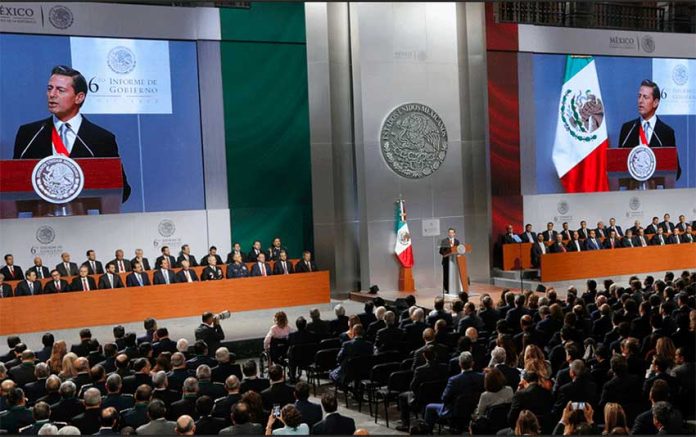President Enrique Peña Nieto declared today that the structural reforms put in place by the current federal government are the greatest achievements of his administration but conceded that security was not a strong suit.
The president made the remarks during an address to lawmakers — and the nation — in which he presented his sixth and final government report.
“Important areas of national life were transformed as a result of labor, energy, economic competition, telecommunications, budgetary, financial, educational, transparency and regulatory reforms,” Peña Nieto said.
“The structural reforms are without doubt the biggest success of this administration, and are our contribution to the country’s future growth.”
He also noted that last year the Organization for Economic Co-operation and Development (OECD) described the package of reforms as the most ambitious reform agenda any member country has undertaken in recent years.
On security, Peña Nieto said “we didn’t achieve the objective of restoring peace and security for all Mexicans in every corner [of the country].”
He added that “to make that desire a reality, a sustained effort for a long period supported by public resources will be required.”
However, the president sidestepped total responsibility for the security situation, instead blaming high levels of violence on the inability of municipal and state police forces to combat small criminal gangs that emerged after cartel leaders, such as Joaquín “El Chapo” Guzmán, were captured.
He highlighted that his administration had proposed a reform to have single command police forces in each state but it didn’t pass Congress.
Peña Nieto described the new accusatory justice system as “the most important [legal] change in more than a century” although he conceded it was “perfectible.”
In contrast, a report published by the Washington Post last December said the system was in turmoil.
Turning to social policy achievements, Peña Nieto said that more than two million people had come out of extreme poverty during his six-year term, adding that if the same rate of poverty eradication continues to be maintained, no Mexicans would live in extreme poverty by the end of the next decade.
On education, Peña Nieto defended the highly-controversial reform his administration implemented, stating that the government sought to put students at the center of education.
“We planted the most important seed of change in public education in Mexico in the last 60 years,” he said.
With regard to the economy, Peña Nieto said that financial, telecommunications and energy reforms are starting to produce results and have opened up new opportunities, while he also stressed that the trade agreement reached last week with the United States reduced economic uncertainty.
In addition, he cited the trade agreement with the European Union, the Trans-Pacific Partnership and the strengthening of trade relations in Latin America as achievements of his administration along with investment in infrastructure, tourism and agriculture.
However, a devaluation of the peso of almost 50% during his term and anemic average economic growth of 2.1% during his first five years in office provided nothing to brag about.
Peña Nieto said that he was leaving “a manageable and declining level of debt” although government debt as a percentage of gross domestic product (GDP) actually increased during his administration from 33.8% in 2012 to 45.4% by mid-2018.
The president, who will leave office at the end of November, also congratulated his successor, Andrés Manuel López Obrador, who will be sworn in on December 1 and has pledged to stamp out corruption and review or change some of Peña Nieto’s key reforms.
Although he faced historically low approval ratings — resulting in a crushing defeat for the Institutional Revolutionary Party at the July 1 elections — and led an administration that was plagued with corruption scandals and record levels of violence, Peña Nieto charged that he has delivered on the vast majority of his public pledges.
“When my administration ends, I will have fulfilled 97% of the promises I made to the public.”
Source: El Economista (sp), El Financiero (sp), Associated Press (en)
